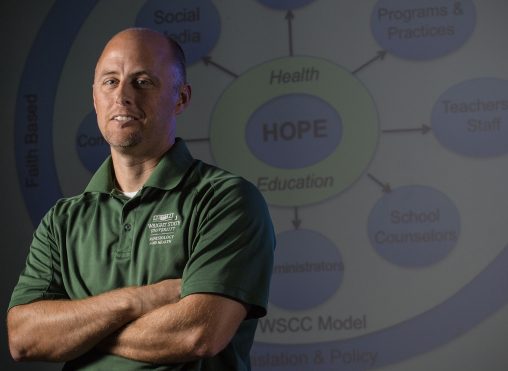
Kevin Lorson, professor and director of the Physical Education Program, helped organize the HOPE Curriculum and Start Talking: Tools for Opioid and Drug Prevention in Schools workshop on Nov. 8. (Photo by Erin Pence)
Schoolteachers and administrators can learn about drug prevention education during a workshop hosted by Wright State University.
HOPE Curriculum and Start Talking: Tools for Opioid and Drug Prevention in Schools will take place Wednesday, Nov. 8, from 8:30 to 11:30 a.m. in the Berry Room of the Wright State University Nutter Center.
The free workshop is open to educators and other school personnel. Educators can register onsite the morning of the workshop.
The workshop is co-sponsored by Start Talking, a drug abuse prevention initiative for children created by Ohio Gov. John Kasich, and the Wright State College of Education and Human Services and the Department of Kinesiology and Health. Generation RX, which seeks to educate people of all ages about potential dangers of misusing prescription medications, is the event partner.
Workshop participants will learn more about the HOPE curriculum, integrating the HOPE lessons, developing a school plan for drug abuse prevention based and using Start Talking to connect with parents and the community. For more information about the HOPE Curriculum and Start Talking visit starttalking.ohio.gov.
The HOPE Curriculum — which is short for Health and Opioid-Abuse Prevention Education — is designed to enhance K–12 health education curriculum in Ohio’s schools by providing lesson plans, assessments, instructional materials, teacher resources, school administrator guides for substance abuse prevention, and tips for connecting with parents and community resources. The curriculum is focused on developing skills and knowledge so students can make healthy choices about drugs and medicines throughout their life.
Kevin Lorson, professor and director of the Physical Education Program at Wright State, led the development of the curriculum. He received a grant from the Ohio Department of Higher Education to organize a statewide team to help schools meet state health education requirements of Ohio HB 367.
The project also included Wright State faculty members Mary Huber, director of the Chemical Dependency Counseling Graduate Program; Judy Jagger-Mescher, director of the Health Education Licensure Program; and Tracey Kramer, director of the Office of Partnership and Field Experience; faculty members from Ohio University and the University of Toledo; and members of the Ohio Association of Health, Physical Education, Recreation and Dance.
Lorson has worked on other initiatives to help Ohio schools include substance abuse education as part of its curriculum.
He is president of Ohio Association of Health, Physical Education, Recreation and Dance, and served on the Ohio Joint Study Committee on Drug Abuse Prevention Education with Ohio Attorney General Mike DeWine. He helped develop recommendations in policy, legislation and programs to prevent drug abuse by students.
“The workshop is another professional development opportunity to prepare teachers to implement the HOPE Curriculum, develop a school-wide drug prevention plan and identify ways to connect with parents and the community using Start Talking and Generation Rx,” Lorson said. “An approach to opioid and drug prevention that connects schools, parents and community together in a shared focus is vital to support our students to make healthy choices.”

 Wright State alum Lindsay Aitchison fulfills childhood space-agency dream
Wright State alum Lindsay Aitchison fulfills childhood space-agency dream  Wright State business professor, alumnus honored by regional technology organizations
Wright State business professor, alumnus honored by regional technology organizations  Wright State University Foundation awards 11 Students First Fund projects
Wright State University Foundation awards 11 Students First Fund projects  Gov. DeWine reappoints Board Treasurer Beth Ferris and names student Ella Vaught to Wright State Board of Trustees
Gov. DeWine reappoints Board Treasurer Beth Ferris and names student Ella Vaught to Wright State Board of Trustees  Joe Gruenberg’s 40-Year support for Wright State celebrated with Honorary Alumnus Award
Joe Gruenberg’s 40-Year support for Wright State celebrated with Honorary Alumnus Award 